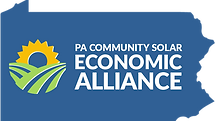“My experience with community solar tells me it is a win-win. The farm-side economics work and it’s a great risk management tool,” says Paul Mason.

By: Anthony Campisi
April 20, 2021
As lawmakers gear up for the busy spring in Harrisburg and bills to enable community solar are introduced, we sat down with someone who knows the benefits of community solar perhaps better than anyone in Pennsylvania.
Paul Mason is a fourth-generation dairy farmer whose property straddles both Pennsylvania, where community solar legislation is being considered, and Maryland, where a portion of his farm currently hosts a community solar garden and where community solar was signed into law in 2015. He’s enjoying the economic benefits that can help so many farmers, and that have led the Pennsylvania Farm Bureau to vocally support community solar.
Mason shared his experience with community solar, and he provides valuable insight on what Pennsylvania farmers can anticipate if the legislature opens up the market to community solar.
Tell me a bit about your dairy farm. How long have you and your family been in business?
I am the fourth generation on my family’s dairy farm. We farm just over 700 acres: half in Pennsylvania, half in Maryland. All of it is to feed and take care of our cows. Dairying is an inherently sustainable and cyclical business model. We grow crops to feed the cows, take the waste from those cows, and apply it to fields to provide nutrients for the next crop and then let the cycle continue every year.
What benefits have you experienced from the community solar program in Maryland, and how could farmers in Pennsylvania benefit?
There have been several benefits from the community solar array that was built on one of our farms in Maryland. One of the biggest benefits to me is that it allowed me to optimize my land use. The array sits on a slope and soil type that is some of the less productive row crop ground on that farm, so the community solar array generates a much better economic return. I think almost any farmer could realize similar benefits.
Why is community solar a good fit for your farm?
The biggest benefit of community solar to me is the economic feasibility of smaller projects. Given that I need basically all my acres to feed my cows, I do not have the luxury of diversification with my crop mix. I grow only the crops my cows eat. But with only needing a handful of acres to make a viable solar array, I can successfully diversify some income without compromising my feed inventories for my cows. Since we needed only seven acres to make the project viable, we could pick the seven acres that would optimize our use of the land on the farm.
Can you explain why community solar is a good fit for farmland that may be underutilized or difficult to make use of, and how the arrays fit in with future land use planning?
On my farm, the array sits on a part of the field that needed to be managed more intensively to achieve a successful row crop due to how water would flow and then lie. Conservation work, soil health, and water management are all things that are critically important to me as a farmer.
The non-intrusive nature of the construction of my solar array means a good deal to me. I view myself as a steward of the land that I hope to be able to pass down to the next generation better than how it was passed on to me. This is all why having a construction process that does not disturb the ground matters. When the project reaches the end of its lifecycle, the posts that hold the solar panels can simply be pulled up, and it is no different than if I had installed a fence for my cows.
What do people need to understand about why farmers need steady and stable sources of income such as leasing land to community solar?
Diversification is one of the best risk management tools for farmers. And I believe there is a reason it is so common. It works. We always deal with the risks of unpredictable weather, which is difficult to manage, and moving commodity prices. So the value of being able to diversify into the energy world with a known fixed return, zero capital expense and zero operational cost is about as good as it gets. There is no current measurable added risk to diversifying by leasing ground to a community solar company.
What would your message be to Pennsylvania’s legislators, who will be deciding whether to pass legislation to enable community solar this session?
Any message I send to legislators always starts with a “thank you,” regardless of their position. Being a legislator is a very complex and difficult job. So, I seek to simply share my view from my experience to do my part to help people be as informed as possible so that they can make the best decision possible.
My experience with community solar tells me it is a big win for landowners. The farm-side economics work, it’s a great risk management tool, negative long-term land effects are minimal to none, and it allows us to do our part to support energy sources that are a bit healthier for our planet.



Leave a Reply